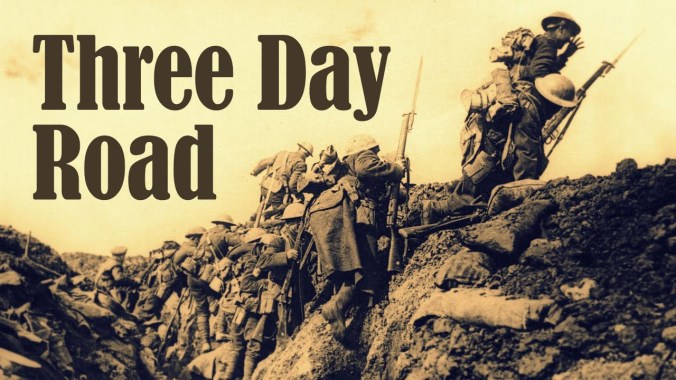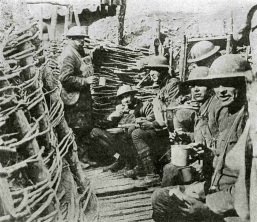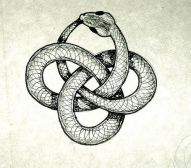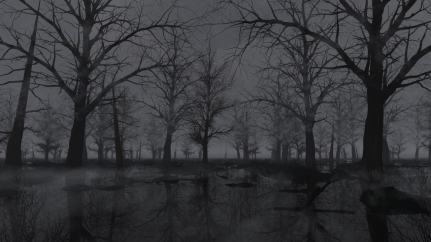
The book Three Day Road by Joseph Boyden is a classic example of a work that needs to be analyzed with the archetypal format in mind. All throughout the second section of the book, there are constant times where Joseph Boyden gives his characters very specific traits and tasks that define them as a whole. Symbolism is heavily used throughout the book from start to finish. The final important benefit from using the archetypal literary theory is having a set of expectations for the main character’s journey throughout the rest of the book.

Throughout the book, we are always unintentionally associating the characters we are unfamiliar with to characters from other books, movies, and games that we are familiar with. In this book, we focus on three main characters – Elijah, Xavier, and Niska. First of all, we focus on the many possible archetypal characters that Elijah could be. Elijah fits many of the archetypes presented in the book, but the two best fitting character types are the outcast and the masquerader. I think this because, in the book, Elijah puts on many different kinds of personalities to entertain others, but it also says a lot about his dislike for his Cree heritage, which makes me label him as an outcast. Here is a quote from when Elijah pretends to have a British accent, “Dear Henry,” Elijah says using their code, “would you be a kind chap and make me a cup of tea?” (144). This is crucial not only because this paints him as a masquerader, but also because it simultaneously gives us the indication that he believes he is an outcast. This was Elijah’s first major step to losing his Cree identity. The reason he did this was to better blend in with the British soldiers surrounding him. He thought that because he was not like them, the y would treat him differently, so he conformed and tried to become one of them. Similarly, Xavier would also be considered an outcast because of his own perception of people around him. He says, “Again today I hear the call. Again today I wait for the others to get there before me before I step among them […] The men are dressed in black and brown and grey suits, and the shoes upon their feet are shiny, so shiny that I wonder what kind of animal the leather has come from. All of the men wear hats, too. All these people wearing hats in summer. I do not understand” (3). This is a quote from the first scene of the book when Xavier feels out of place in his own area of the dwelling. This is not Xavier’s only time feeling like an outcast in the book. Later in the book when Xavier and Elijah are together during the war, Xavier constantly compares himself to Elijah and the choices Elijah makes (often Xavier plays it safe as Elijah is more of a risk taker). This makes Xavier feel like an outcast not only when compared to Elijah but also when compared the other soldiers as well. Finally, the character of Niska is most definitely viewed as the elder and caregiver. We know this because in the book, she is much older than Xavier and Elijah, and she behaves as if she is the voice of reason and the more logical one in many scenarios. Furthermore, we have evidence of her being the caregiver because when Xavier returns from the war, “tired and bruised” (124), Niska steps in to help him recover.
y would treat him differently, so he conformed and tried to become one of them. Similarly, Xavier would also be considered an outcast because of his own perception of people around him. He says, “Again today I hear the call. Again today I wait for the others to get there before me before I step among them […] The men are dressed in black and brown and grey suits, and the shoes upon their feet are shiny, so shiny that I wonder what kind of animal the leather has come from. All of the men wear hats, too. All these people wearing hats in summer. I do not understand” (3). This is a quote from the first scene of the book when Xavier feels out of place in his own area of the dwelling. This is not Xavier’s only time feeling like an outcast in the book. Later in the book when Xavier and Elijah are together during the war, Xavier constantly compares himself to Elijah and the choices Elijah makes (often Xavier plays it safe as Elijah is more of a risk taker). This makes Xavier feel like an outcast not only when compared to Elijah but also when compared the other soldiers as well. Finally, the character of Niska is most definitely viewed as the elder and caregiver. We know this because in the book, she is much older than Xavier and Elijah, and she behaves as if she is the voice of reason and the more logical one in many scenarios. Furthermore, we have evidence of her being the caregiver because when Xavier returns from the war, “tired and bruised” (124), Niska steps in to help him recover.
One of the key aspects of Three Day Road is the symbolism. All throughout the book, symbolism is used. One of my personal favourite uses of symbolism so far in the book is the symbolism behind the lynx.  “It was the lynx that came to me most strongly, his growl puffing out the walls of my tent like a great wind trying to escape. And I asked
“It was the lynx that came to me most strongly, his growl puffing out the walls of my tent like a great wind trying to escape. And I asked
the lynx a favour that would change me forever” (176). The lynx is often symbolized as the master seer, and it is said that the lynx can see through solid objects and into the soul of someone. This is important because, in this quote, the lynx would be able to see right through any lies and ill spirit that Xavier could have been hiding. The fact that lynx came to him would mean that the lynx thought it was a good idea! I think Joseph Boyden choose a lynx instead of any other animal because of this specific symbolism. Imagine if this scene happened with a duck – here’s what it would look like: “It was the duck that came to me most strongly, his growl puffing out the walls of my tent like a great wind trying to escape. And I asked the duck a favour that would change me forever.” The duck doesn’t really convey the same message as the lynx. The lynx is also used as a symbol of strength. It comes to Xavier and he is bold for asking it a favour since he knows that he is lesser and not in a position to be asking favours. It is clear that the symbols in this book are mainly used in  the context of nature. One of my personal favourites is this quote, “Elijah learned to talk his way out of anything, gave great long speeches so that his words snakes themselves like vines”(59).
the context of nature. One of my personal favourites is this quote, “Elijah learned to talk his way out of anything, gave great long speeches so that his words snakes themselves like vines”(59).
The symbolism here is so valiant and blunt which is why I believe that Joseph Boyden chose to use the snake instead of another reptile. Biblically, the snake is a symbol of deception and evil. The deception and evil that is associated with the snake are crucial in this quote because it tells us that Elijah’s words were dishonest and deceitful, which says a lot about Elijah’s character. If we keep analyzing this quote, we can also look at the analogy and symbolism of the vines. When Joseph wrote this, he used vines to emphasize the elaborate construction of the lies and how they are tied together. If we look more at the specific symbolism of vines, we see that they are constantly referred to as a strong aspect of nature that can support much weight and weather. With this in mind, we can also interpret the vines as a strong foundation for his lies or that the lies he told were of a strong impact.

One of the things the reader can do when applying archetypal literary theory is to set expectations for the main characters later in the book. What I’m going to do now, is talk about my own personal set of expectations that I believe will happen to the main characters. I personally think that Elijah will become overcome with the urge to kill, to the point where he takes pleasure from it and considers it a sport! One of the key factors that pushes me to believe this is when he starts to skin the heads of the dead people around him so that he has proof that he’s been killing – essentially collecting trophies! “What will collecting these trophies do for me?” Elijah Asked. “They will buy you honor among us” Francis replies. “And we are honorable men” (206). This is where I left off in my reading thus far. I predict that when Elijah returns back to the base with all of the scalps he has collected, he’ll be deemed a hero and this will only feed into his ego and drive to murder. One of my more bold estimates would be that as Xavier gets involved, he will eventually have to defend himself from Elijah because of Elijah’s urge to kill. One of the key parts that led me to believe this is how much internal thinking Xavier does about his actions when compared to Elijah’s. In one part of the book, Xavier thinks about leaving his post and risking his life to go get more sniper bullets because he has run out. He decides not to, and then questions why he can’t be more bold and courageous like Elijah. I think eventually, we’ll see the conflict between Elijah and Xavier which will lead to the death of one of them!
To conclude, in order to completely interpret the writings of Joseph Boyden, you must properly apply archetypal literary theory! Unraveling Boyden’s specific use of symbolism and character identity is key to making these archetypal connections. By making these connections, we can make predictions about the text that will influence our expectations and interpretations of the characters and events in the book! Overall, by using this literary theory, the text becomes more clear, relatable, and exciting to read




